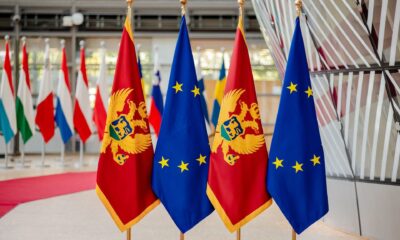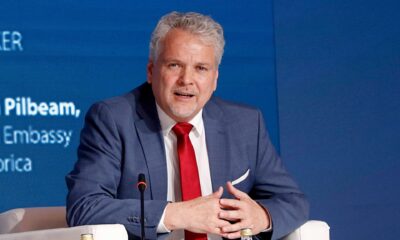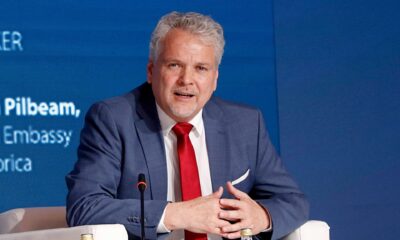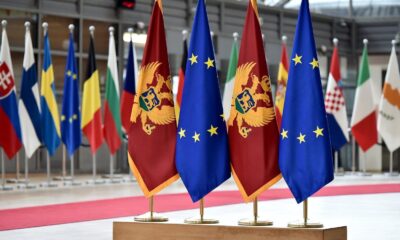Science
Three Dublin Universities Secure €684 Million in ERC Grants
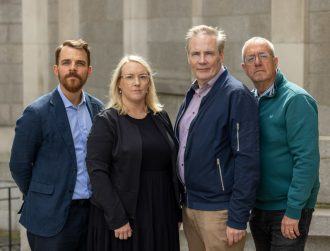
Researchers at three universities in Dublin have been awarded a significant funding boost as part of the European Research Council’s (ERC) latest round of Synergy Grants. The ERC announced a total of €684 million allocated to 239 research teams across Europe, with University College Dublin (UCD), Trinity College Dublin, and Dublin City University (DCU) among the recipients. Each successful project will receive approximately €10.3 million over six years, aimed at fostering collaboration and advancing scientific discovery.
This year’s competition was particularly intense, with only about one in ten proposals selected for funding. According to the ERC, the aim of the Synergy Grants is to bring together outstanding researchers, enhancing the potential for groundbreaking discoveries. Applications were open to teams of two to four principal investigators (PIs) from various disciplines, with at least three PIs required to be based in EU member states or associated countries.
Innovative Projects from Dublin Researchers
Among the awarded projects, researchers from UCD are part of an international initiative titled “Disrupt”, led by Prof Leo de Vreede at TU Delft. This project aims to develop fully digital radio-frequency (RF) power architecture that could reduce wireless network emissions by up to 50 percent. UCD’s Prof Anding Zhu and Prof Bogdan Staszewski are collaborating with Prof Rüdiger Quay from Fraunhofer IAF on this initiative, which addresses the significant carbon footprint of wireless networks, comparable to that of aviation.
Prof Zhu, head of the RF and Microwave Research Group at UCD, expressed that receiving the ERC grant is a testament to the project’s “bold and interdisciplinary vision.” He stated, “This €10 million grant empowers us to push the frontiers of wireless technology by combining advanced materials science, semiconductor device innovation, and RF system architecture in a truly transformative way.”
Prof Staszewski, also from UCD, views this grant as a continuation of his previous ERC Starting Grant. He highlighted the increased challenge of advancing research to radio-frequency power levels significantly higher than before.
Interdisciplinary Focus on Justice and Interrogation Practices
DCU’s Prof Yvonne Daly and Trinity’s Prof Shane O’Mara are part of the “Justice” team, which aims to investigate coercive interrogation practices and develop more humane interviewing techniques. This interdisciplinary project brings together experts from law, psychology, neuroscience, and data science. The goal is to create methods that protect rights, ensure reliable information gathering, and strengthen public trust in justice systems.
Prof Daly, who specializes in criminal law and evidence at DCU, expressed excitement about the collaboration, stating, “We’ve already learned so much from one another in devising our cross-disciplinary work programme and look forward to growing a strong team to undertake this ambitious research.”
Project lead Prof O’Mara, affiliated with Trinity’s School of Psychology and the Trinity College Institute of Neuroscience, emphasized the project’s focus on transitioning from confession-seeking to truth-seeking. He stated, “By combining law, psychology, neuroscience, and data science, we’ll attempt to pinpoint when and why coercion creeps into interviews, and devise practical ways to prevent it.”
The Justice team also includes Prof Dave Walsh from De Montfort University and Dr Bennett Kleinberg from Tilburg University, reflecting the project’s comprehensive approach.
In a statement regarding the funding announcement, Ekaterina Zaharieva, European Commissioner for Start-Ups, Research and Innovation, noted the international nature of this year’s awardees. “Europe’s frontier research has never been so international,” she remarked. “This global collaboration strengthens European science, gives our researchers access to world-class expertise and infrastructure, and brings leading scientists from around the world closer to Europe.”
The ERC’s strong emphasis on collaboration and interdisciplinary research is evident in the diverse array of projects funded this year, signaling a commitment to addressing pressing scientific challenges through innovative partnerships.
-

 Entertainment2 months ago
Entertainment2 months agoAnn Ming Reflects on ITV’s ‘I Fought the Law’ Drama
-

 Entertainment3 months ago
Entertainment3 months agoKate Garraway Sells £2 Million Home Amid Financial Struggles
-

 Health2 months ago
Health2 months agoKatie Price Faces New Health Concerns After Cancer Symptoms Resurface
-

 Entertainment2 months ago
Entertainment2 months agoCoronation Street’s Carl Webster Faces Trouble with New Affairs
-

 Entertainment2 months ago
Entertainment2 months agoWhere is Tinder Swindler Simon Leviev? Latest Updates Revealed
-

 Entertainment3 months ago
Entertainment3 months agoKim Cattrall Posts Cryptic Message After HBO’s Sequel Cancellation
-

 Science3 weeks ago
Science3 weeks agoBrian Cox Addresses Claims of Alien Probe in 3I/ATLAS Discovery
-

 Entertainment2 months ago
Entertainment2 months agoOlivia Attwood Opens Up About Fallout with Former Best Friend
-

 Entertainment3 months ago
Entertainment3 months agoMarkiplier Addresses AI Controversy During Livestream Response
-

 Entertainment3 months ago
Entertainment3 months agoMasterChef Faces Turmoil as Tom Kerridge Withdraws from Hosting Role
-

 Entertainment4 months ago
Entertainment4 months agoSpeculation Surrounds Home and Away as Cast Departures Mount
-

 World2 months ago
World2 months agoCole Palmer’s Mysterious Message to Kobbie Mainoo Sparks Speculation

